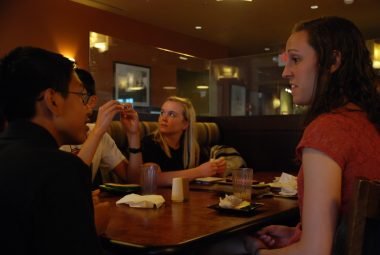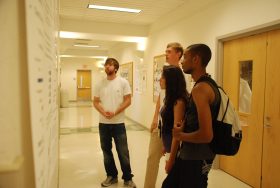Introducing scholars in the college access program to current Elon students can teach high school students about career and academic opportunities.

*****
By Natalie Allison ’13
Elon students participating in the university’s Summer Undergraduate Research Experiences program shared their work on Thursday with dozens of local high school students on campus as part of a college access and enrichment program.
The high school students, first-generation college-bound students staying on Elon’s campus for four weeks as a part of the Elon Academy, took the opportunity to learn from SURE scholars about future possibilities in undergraduate research – and just what drives young adults to spend their summer over books and in laboratories.
Professor Deborah Long, director of the Elon Academy, and Professor Paul Miller, director of the university’s undergraduate research program, started the event in 2010.
“We wanted to make sure (Elon Academy students) knew research opportunities are available when they do actually go to college, so this way they can connect with our students and understand that even as an undergraduate they can do research,” Long said. “The typical stereotype is that research is always done in a science lab, but they can do research in any field.”

After breaking into groups based on fields of interests, SURE scholars ate lunch with the Elon Academy participants and took them to their respective academic buildings to give tours of where the research occurs.
“It gives SURE scholars an opportunity to see another layer to what it means to be a scholar,” Miller said. “You’re responsible to talk about your work, interact with people about their work and to teach. It may be an informal teaching opportunity, but it is a teaching opportunity.”
Meg Miller, a rising senior biochemistry major, said the opportunity for high school students to talk with college students about the research process is something she wishes more young people could have.
“Coming from a family in which I’m one of the first to go to college, a program like this would have been invaluable,” Miller said.
She said that most first-year students enter college thinking the research process is reserved for very few select students, when it’s usually a matter of talking with a professor and simply getting started.
“It’s good for them to see that we’re real human beings that stutter and mess up our research from time-to-time,” Miller said. “I want them to be able to say, ‘If they can do it — they’re normal — then we can, too.”
Brittany Dorsett, a rising high school junior and Elon Academy participant, plans to major in some form of chemistry when she attends college and wanted to learn more about the opportunities available through a college chemistry program.
“I had been bugging one of my (Elon Academy) mentors to take me on a tour of the labs, so this was perfect,” she said. “I didn’t really know anything about research beforehand.”
Long said that regardless of whether Elon Academy students change their minds about their future college majors, opportunities to be around successful college students are always important.
“Students in the SURE program are the students our students hope to be,” she said. “The more we can expose them to young people fairly close to their age who are succeeding in college, the more they think, ‘I can do this.’”


